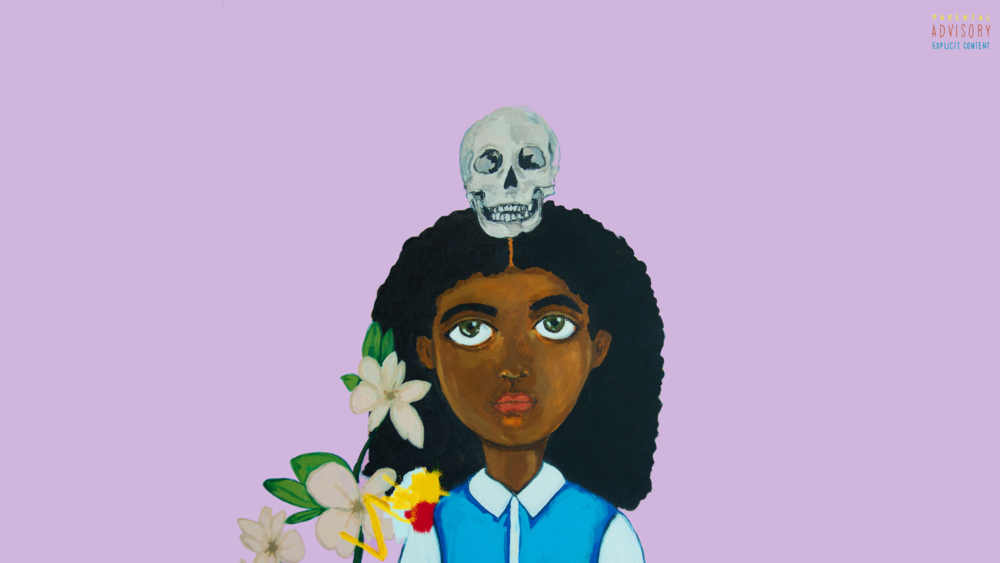Fatimah Warner was born in 1991 in the Bronzeville neighborhood of Chicago. As a child, she spent a considerable amount of time in her mother’s local book store, reading and developing her own ability as a writer. In 2010, she became an acclaimed student slam poet, incorporating her own thoughts regarding her identity as an African-American woman into her work. However, it would not be until 2013 that she would become known to the world as “Noname” when she appeared on Chance The Rapper’s song “Lost” off of his critically praised mixtape “Acid Rap.”
In 2016, Noname released her debut mixtape “Telefone”. The project is paired with a beautiful hand-painted cover of a young black girl surrounded by flowers with a skull balanced on top of her head. In an interview with Yahoo entertainment, the artist, Nikko Washington claimed that it was “a reflection of a young African-American child in this world right now. I tried to make her represent Noname, but not be her.” It was also designed to represent a balance between life and death, which is one of the leading themes of the mixtape.
The music itself, which in total lasts 33 minutes, draws heavily from soul and gospel to create a gorgeous symphony of sounds that feel happy and light upon first listen, but reveals a deeper sadness as the mixtape goes on. Noname is able to speak to a number of different topics throughout the project, such as her race, gender, and her struggles with religion and an abortion she had.
The album starts off in a very happy place sonically, with the opener “Yesterday” pulling the listener in with soft, dream-like synths that lead into sweet piano melodies and quick, jazzy drums that compliment Noname’s complex flow. However, these airy and kind musical qualities are paired with sadder lyrics that touch on newly found fame, the effects of money and finding what is truly important in one’s life. The chorus of this song introduces listeners to a pattern that will continue for much of the record. Noname often taps guest vocalists to deliver beautiful choruses and background vocals that often draw from gospel sounds. The lyrics of the chorus are very melancholic with proper context, as they talk about the memories of a recently passed away friend.
This album feels like a descent from bittersweet tunes with songs like “Yesterday,” “Sunny Duet” and “Diddy Bop” to much sadder tracks dealing with themes of death, such as “Casket Pretty,” “Bye Bye Baby” and “Shadow Man.” “Bye Bye Baby” is a specifically sad track. Split into two halves, the song starts as Noname reflecting on her abortion, and speaking directly to the baby who she believes is now in heaven. The second half is told from the perspective of the baby, who says it understands its mother’s decision and confirms that it has found its way to heaven.
“Shadow Man” is the final track on the album. Featuring layered vocals and a bouncy drum line, the track feels organic and live. Featuring verses from Noname, Smino and Saba, each artist reflects on death and what their funerals will be like. It’s a somber and sobering end to an album that blends emotions and vibes in a way that leaves the listener feeling reflective.
Every track on this album feels crucial. There is not a single song that could have been left out or that comes off unnecessary in the grand scheme of things. Noname kicked off her musical career in an effective way, solidifying her place as a key member of the array of talented rappers from Chicago led by artists like Chance The Rapper and Kanye West. Now, following her debut album and follow up to “Telefone,” “Room 25,” Noname shows no signs of slowing down her climb to the top. “Telefone” is available on all streaming services.
Warning: this album contains explicit language and adult themes.




